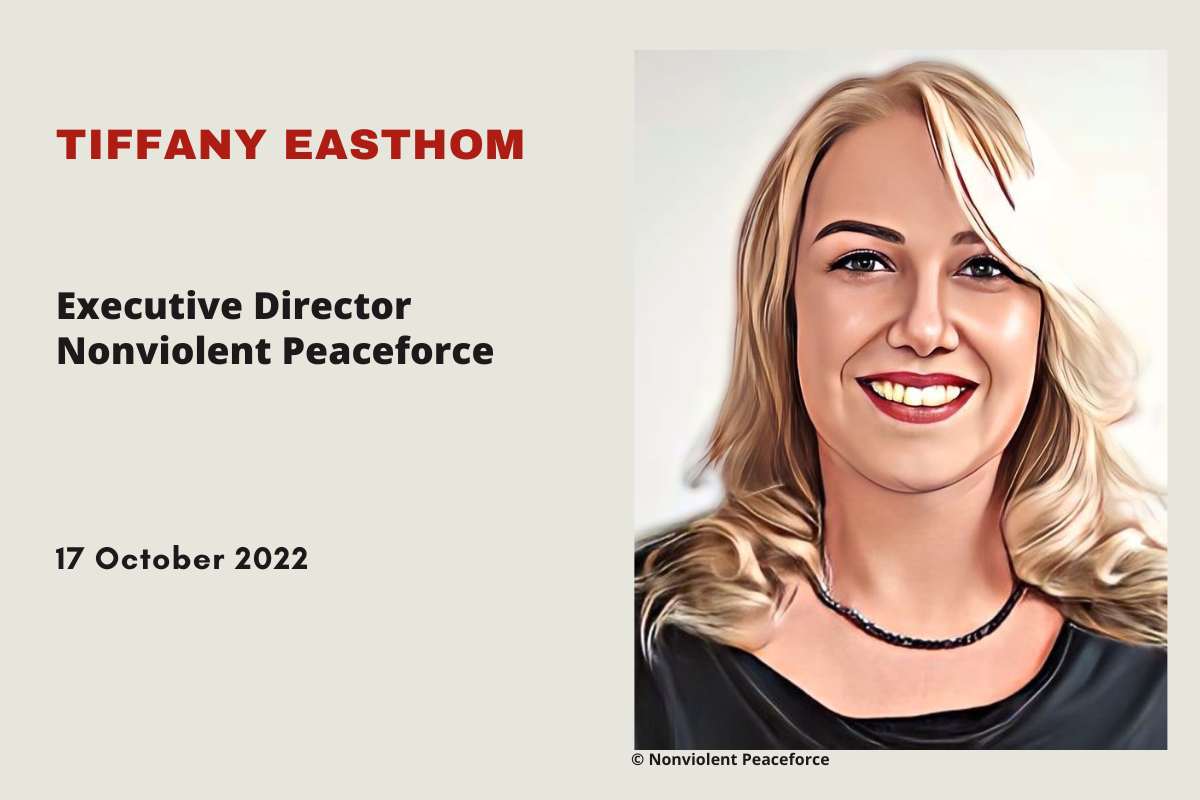The Interview | Tiffany Easthom
 |
How would you present your organization in a few words? What entails your position? What is your goal? |
I have the great honour of being the Executive Director of Nonviolent Peaceforce. NP’s mission is to protect civilians in violent conflicts through the implementation of unarmed civilian protection (UCP), building peace side by side with local communities, and advocating for the wider adoption of these approaches to safeguard human lives and dignity. Our work is grounded in the lineage of nonviolence, is relationship based and intimate. Our actions to stop violence emerge from the creative engagement with communities during crises, even as we design long-term plans. We prioritise practical responses to immediate threats of violence, even as we work to address structural violence. We foster an environment in which communities can re-imagine nonviolent responses to direct physical violence. We operate in service of the people we protect. We don’t promote the interests of international institutions, governments, or political parties. Our independence strengthens our ability to bring people together in hostile environments.
 |
Among the concentration of actors in Geneva (IOs, NGOs, permanent missions, academia, and the private sector), who do you work with and how? |
NP appreciate the opportunity to work with networks such as the Geneva Peacebuilding Platform, the Global Protection Cluster and other NGOs working on civilian protection on various policy and practice initiatives. It is a great opportunity to work with mutually reinforcing approaches to contributing to building positive peace. In Geneva, we appreciate having the opportunities to collaborate with the permanent missions on various thematic and/or geographic priorities. A great example is the “Forward Leaning Relationship-Based Access” event we are co-hosting with the Permanent Mission of the Kingdom of the Netherlands, on 25 October, within the Global Protection Cluster’s annual Thematic Week. Finally, we have enjoyed planning events together with the University of Geneva and the Graduate Institute, and perhaps most notably have had fantastic experiences with interns coming from these schools.
 |
What are the strengths and weaknesses of Geneva with regards to the development of your activity? |
Geneva’s identity as a center for international civil society and as a place committed to enabling humanitarianism, peacebuilding and human rights is unique in the world. It is a thriving ecosystem of networks where ideas, innovation and practice can develop. The drawback of course is that it can be a bit of a bubble, removed both in distance and daily lived experience from those most impacted by violence and deprivation.
 |
|
I hope we can reimagine next generation global governance as a process by which the asymmetrical global power relationships that allow the normalization of violence, deprivation and the mechanistic world order to thrive is reconstructed to facilitate an integralist worldview. It is no longer sufficient to think that if we “add” people into the existing structure, it is inclusive, the structure itself needs to adapt.
 |
|
One question that I do love to answer is why do I, after 13 years, still work for NP? I started with NP as a country director when we were a much smaller organization. We had very few resources at that time, no profile to speak of and a newly developing methodology. The people drawn to being part of the work that NP does were and are extraordinary. Our colleagues come from wildly different backgrounds and identities, drawn together and willing to do the hard work of changing our collective norms around the use of or threat of force to achieve objectives. An essential part of this process is doing the work ourselves, learning how we each have and use power and privilege in our lives, working learning how to hold creative and constructive tensions around things like taking a firm stance against violence while keeping an open heart for those who use violence, healing, redemption and accountability and holding space for the serious while always finding oxygen for joy. We cultivate humility, recognizing that while we can feel proud and celebrate successes, we are just a contribution in highly complex situations and our most important role is being in solidarity with and in support of those most impacted by violence.
